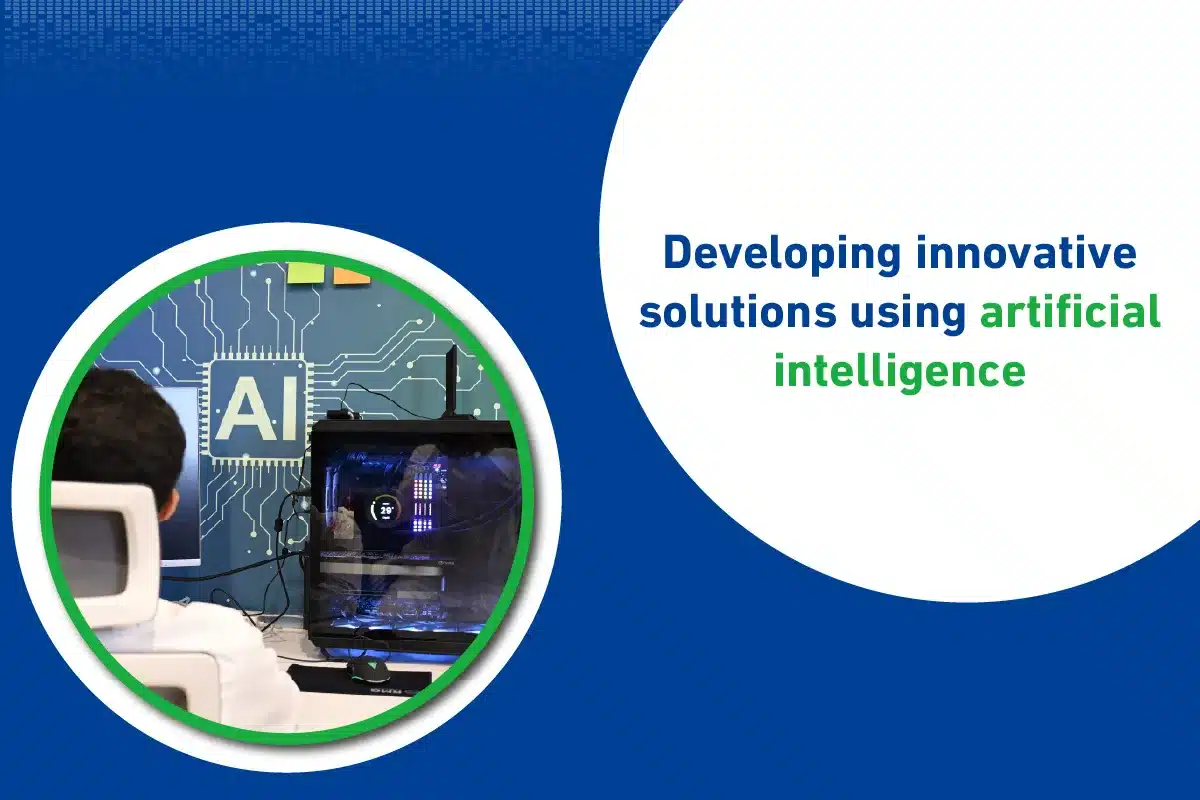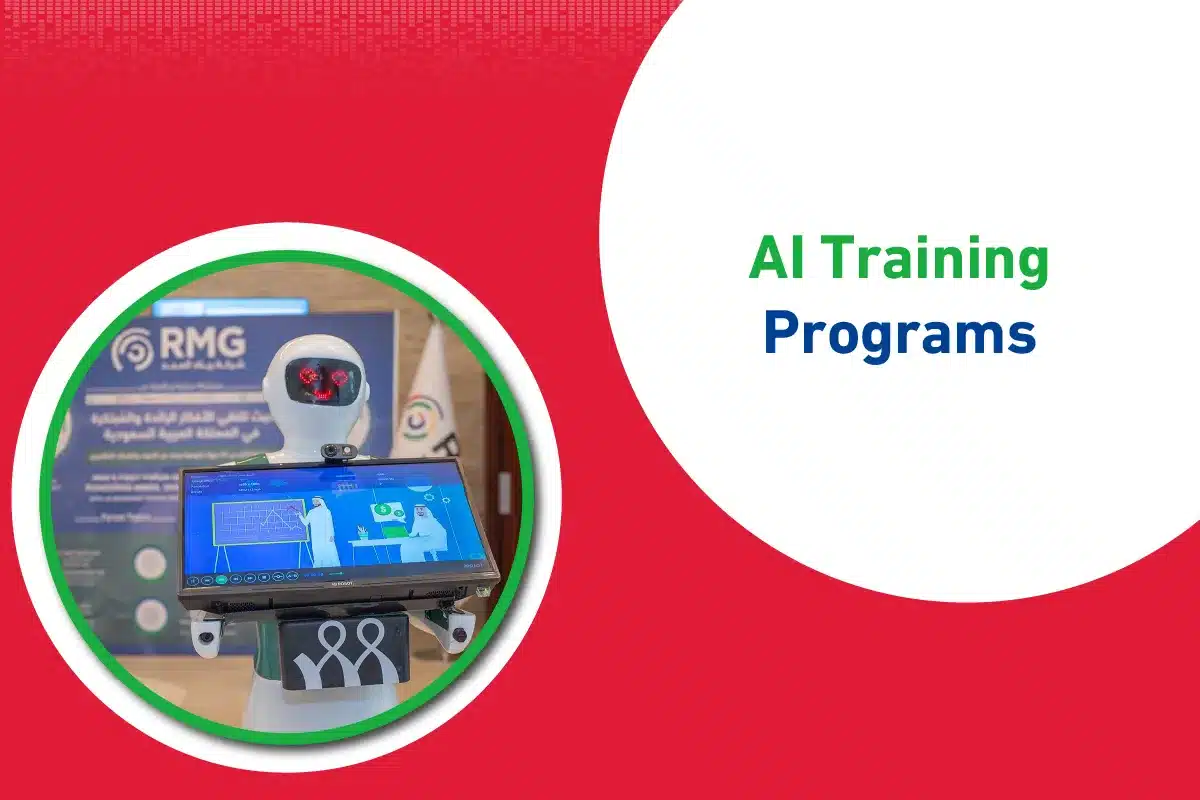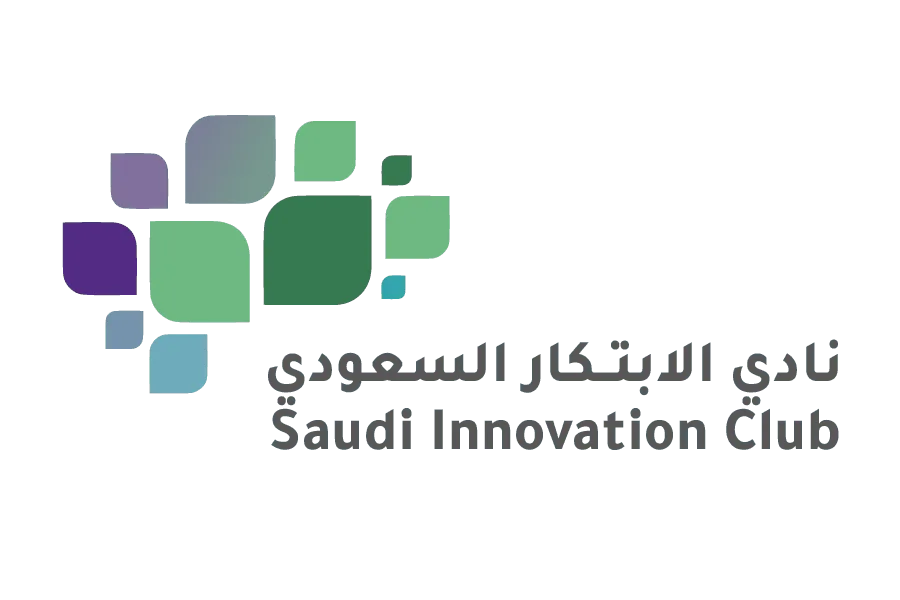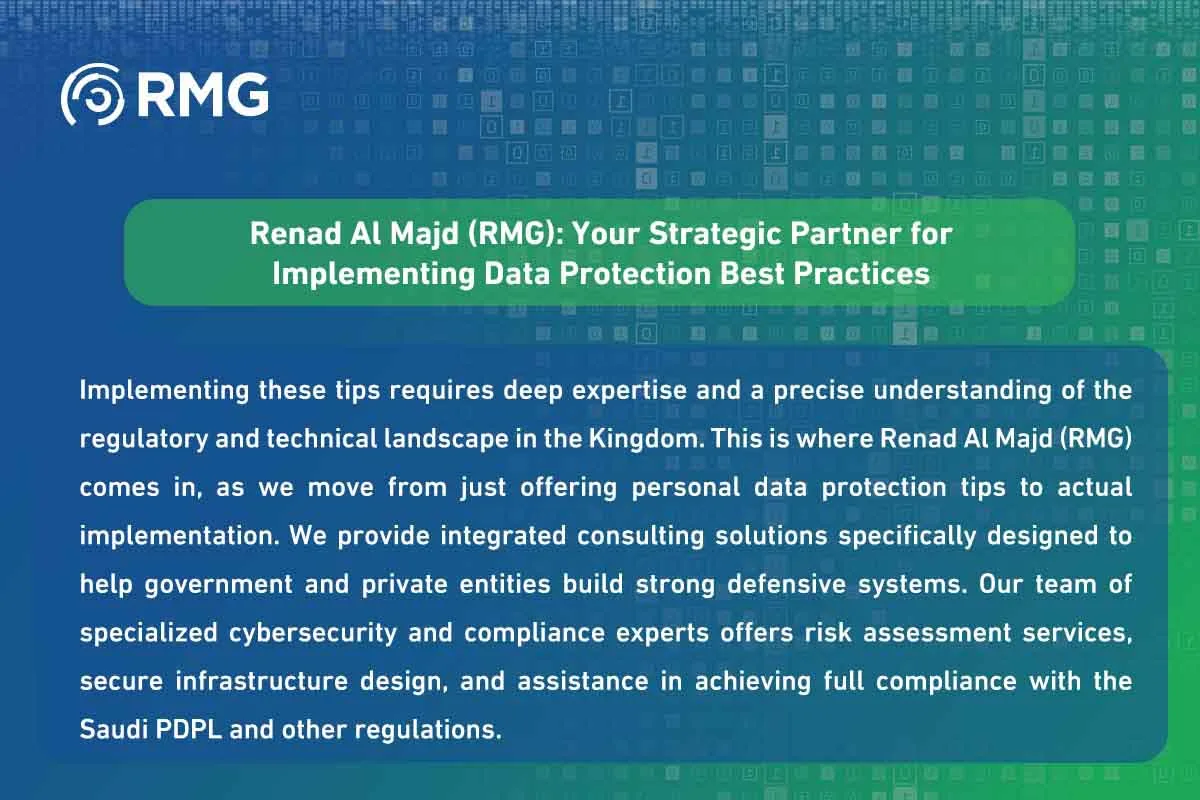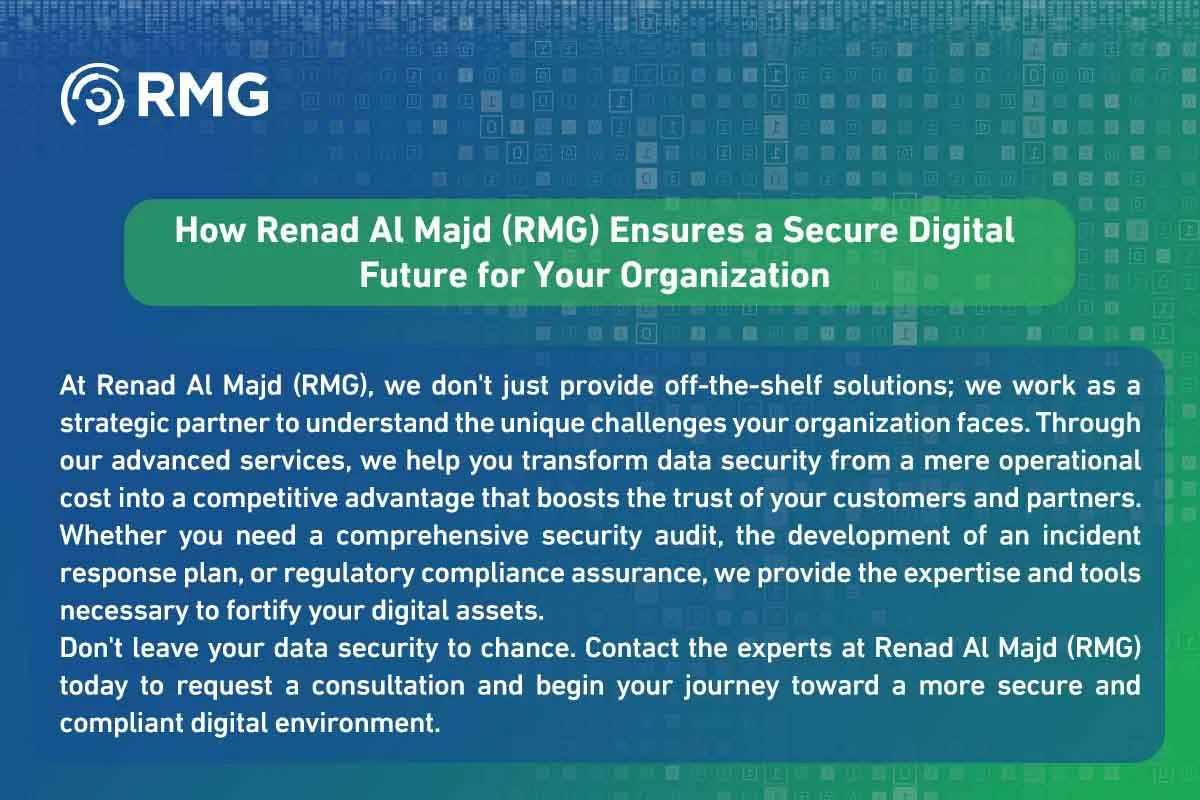Blog Body
Discover the most essential personal data protection tips designed for public and private organizations in the Kingdom. Learn how to fortify your digital assets, comply with local regulations, and avoid cyber risks with the experts at Renad Al Majd (RMG).
In the digital age, where public and private organizations in Saudi Arabia rely on data more than ever before, protecting personal information is no longer an option—it has become a strategic necessity to ensure business continuity, reputation, and trust. Any data leak or breach can lead to severe consequences, including significant financial losses, regulatory penalties, and the erosion of customer and partner trust. Therefore, we offer a set of practical guidelines and tips that form the cornerstone of a robust defensive strategy.
Data Classification: The First Step Toward Proactive Security
Before you can protect your data, you need to know what you have. Start by classifying all the data you collect, store, and process based on its sensitivity and importance (e.g., public, internal, confidential, top secret). This approach allows you to apply different security controls tailored to the value of each data type, ensuring that security resources are focused on the most critical assets. This is one of the most vital personal data protection tips to implement.
Enforce Strict Access Control Policies
Not every employee should have access to all of the organization’s data. Apply the “Principle of Least Privilege,” which means giving employees the minimum access rights necessary to perform their jobs. Use role-based access control (RBAC) systems to simplify permission management and reduce the risk of unauthorized access, both internal and external.
Data Encryption: Your Impenetrable Digital Shield
Encryption is the process of converting data into a code to prevent unauthorized access. It is an essential part of personal data protection. Data should be encrypted at all stages: while it is stored (Data at Rest) on servers and databases, and while it is transmitted (Data in Transit) across internal networks or the internet. Encryption ensures that even if a hacker gains access to your data, they won’t be able to read or use it without the decryption key.
Employee Training and Security Awareness
Employees are the first line of defense, but they can also be the weakest link in the security chain. It is crucial to launch regular awareness and training programs about cyber risks, such as phishing attacks, social engineering, and the importance of using strong passwords. A security-aware employee is an invaluable asset in protecting your organization’s data.
Continuous Updates for Systems and Software
Cyberattacks often exploit known security vulnerabilities in outdated software and systems. Make sure you have a systematic process for applying security updates and patches as soon as they are released for all operating systems, software, and applications used in your organization. This simple step closes the door to many automated attacks. It is considered one of the most important personal data protection tips to implement.
Secure Networks and Infrastructure
Secure your network using advanced firewalls, intrusion detection and prevention systems (IDS/IPS), and endpoint security solutions. You should also segment your network to isolate critical systems from the rest, which limits the spread of any potential breach within your infrastructure.
Develop a Clear Cyber Incident Response Plan
Don’t ask, “Will we be breached?” Instead, ask, “What will we do when we are breached?” Having a pre-prepared and tested Incident Response Plan ensures a quick and organized response to minimize damage, contain the threat, and recover as quickly as possible, while complying with the Kingdom’s regulatory reporting requirements.
Third-Party and Vendor Risk Management
Organizations often share data with external vendors and partners. It is essential to conduct a thorough security assessment of any third party that can access your data and ensure they adhere to the same security standards you apply. Contracts should include clear clauses about data protection responsibilities and audit mechanisms.
Implement a “Data Minimization” Policy
Only collect and retain personal data for the specific purpose for which it was gathered and for the necessary duration. Minimizing the amount of data you store automatically reduces the scale of potential risks and damages in the event of a leak. Establish a clear policy for the secure disposal of data that is no longer needed.
Regular and Secure Data Backups
Backups are your organization’s lifeline in the event of ransomware attacks or system failures. Regularly back up critical data, and periodically test the restoration process to ensure its effectiveness. Make sure to store backups in a secure, separate location, with at least one offline or “air-gapped” copy.
Periodic Security Review and Audits
Cybersecurity is not a one-time project; it is a continuous process. Conduct regular security audits, penetration testing, and vulnerability assessments to identify weaknesses in your systems and address them proactively before attackers can exploit them. This is another one of the most important personal data protection tips to implement.
Secure Physical Assets and Protect Physical Access
Personal data protection tips are not limited to the digital world. Physical access to data centers, server rooms, and offices containing sensitive information must be secured. Use surveillance cameras, access control systems, and logs to ensure no unauthorized person can access physical assets.
Comply with the Saudi Personal Data Protection Law (PDPL)
Saudi Arabia has enacted the Personal Data Protection Law (PDPL) to enhance the protection of individuals’ data rights. All organizations must ensure they understand and apply the requirements of this law, including obtaining consent, defining data collection purposes, appointing a data protection officer, and adhering to the rights of data subjects. Compliance is not an option; it is a legal obligation.
Renad Al Majd (RMG): Your Strategic Partner for Implementing Data Protection Best Practices
Implementing these tips requires deep expertise and a precise understanding of the regulatory and technical landscape in the Kingdom. This is where Renad Al Majd (RMG) comes in, as we move from just offering personal data protection tips to actual implementation. We provide integrated consulting solutions specifically designed to help government and private entities build strong defensive systems. Our team of specialized cybersecurity and compliance experts offers risk assessment services, secure infrastructure design, and assistance in achieving full compliance with the Saudi PDPL and other regulations.
How Renad Al Majd (RMG) Ensures a Secure Digital Future for Your Organization
At Renad Al Majd (RMG), we don’t just provide off-the-shelf solutions; we work as a strategic partner to understand the unique challenges your organization faces. Through our advanced services, we help you transform data security from a mere operational cost into a competitive advantage that boosts the trust of your customers and partners. Whether you need a comprehensive security audit, the development of an incident response plan, or regulatory compliance assurance, we provide the expertise and tools necessary to fortify your digital assets.
Don’t leave your data security to chance. Contact the experts at Renad Al Majd (RMG) today to request a consultation and begin your journey toward a more secure and compliant digital environment.






